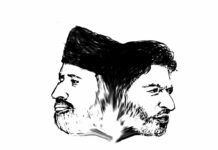Mehraj ud din
 Kashmir was and is equally conscious of its place in global Muslim Ummah. The fragrance of Islam has intertwined Kashmiri people around its charming and ever-lasting exuberance. Intrinsically, the people of Valley eschewed its brahamanical creed “in words not deeds” and opened them to the gateway of sacred Islamic world. The beautiful reception of Islam in Kashmir discarded the “old gods” and Islam was given the highest seat of sanctity. Be it as it may, history bears this fact, Kashmir transformed itself drastically changing over to a well-knit Islamic sacrosanct tradition. Islam is the only living and existing worldview which not only transformed rather transformed a “uncouthly society” into the “nursery of heroes” about whom Quran said “I (God) am and they (suhaba) are satisfied with me”. The emergence of Islam in Kashmir has drastically transformed the outlook of Kashmiri people towards life vis-à-vis made them conscious of their role in implementing the precepts of Islam in letter and spirit.
Kashmir was and is equally conscious of its place in global Muslim Ummah. The fragrance of Islam has intertwined Kashmiri people around its charming and ever-lasting exuberance. Intrinsically, the people of Valley eschewed its brahamanical creed “in words not deeds” and opened them to the gateway of sacred Islamic world. The beautiful reception of Islam in Kashmir discarded the “old gods” and Islam was given the highest seat of sanctity. Be it as it may, history bears this fact, Kashmir transformed itself drastically changing over to a well-knit Islamic sacrosanct tradition. Islam is the only living and existing worldview which not only transformed rather transformed a “uncouthly society” into the “nursery of heroes” about whom Quran said “I (God) am and they (suhaba) are satisfied with me”. The emergence of Islam in Kashmir has drastically transformed the outlook of Kashmiri people towards life vis-à-vis made them conscious of their role in implementing the precepts of Islam in letter and spirit.
The great transformation helped us to identify God and shaped our whole existential outlook. The unrelenting concatenation of Kashmiri people with Islam evolved galaxy of Scholars like Allama Iqbal, Anwar Shah Kashmiri, Mawlana Anwar Shah Shopyani and innumerable other stalwarts shaped the collective conscience of this nation. Kashmir became the hub of spiritualism idealized itself as a garden of God resonating with the Islamic essence.
The evolution of different movements in Kashmir became one of the important reasons for the Islamization of Kashmir. The wave of change and reform had been sweeping over, most parts of sub-continent for quite some time before it reached Jammu & Kashmir. It were movements like Anjuman Nusrat-al Islam, Jamat Islami, Jamiat Ahle Hadith and Tablighi Jamaat which transformed Kashmiri into a vibrant and religiously conscious society.
The indispensable contribution of these movements has shaped the collective conscience of Muslims in Kashmir and helped them to relate their existence with the essence of Islam. The pluralistic underpinnings of these movements presented Kashmiri as a hub of intellectual vibrant and dynamic society. Nevertheless, we cannot disagree about the unrelenting contribution of these movements but the post-2000 changed the whole discourse in Kashmir’s religious movements. It seems that these movements are at loggerheads dismantling and disbanding the pluralistic trans-historical edifice of Kashmir. The rise of other movements has also played a key role in order to create a clash of interests among religious movements. The separation of banners and stages created an unending animosity which resulted in the disappearance of toleration in the religious oriented youth of Kashmir. Once, Wahiduddin Khan beautifully said, “When you are supposed to gather together on a common platform for the pleasure of Allah then do leave your sectarian biases and come to the common stage”. Unfortunately, we were never able to do so in Kashmir and our particularistic banner define our understanding and interpretation of Islam. This attitude not only created ripples in the pluralistic dynamism of Kashmir but rather divides us in head and heart vis-à-vis gives free hand to our “Other”.
The separations of banners and ideological ruptures in religious movements of Kashmir have convulsed the whole edifice of Islam in Kashmir. Ziauddin Sardar once said “Muslims are on the verge of social, moral and religious extinction simply because they have led parochialism to rule their minds”. I believe this quotation aptly defines our religious movements which tend to forget that the ramifications of their decision not only forestall their future but the collective future of the Muslims of Jammu and Kashmir.
Mehraj ud din is a doctoral candidate at the shah-i-Hamdan Institute of Islamic Studies.He can be mailed at [email protected]















